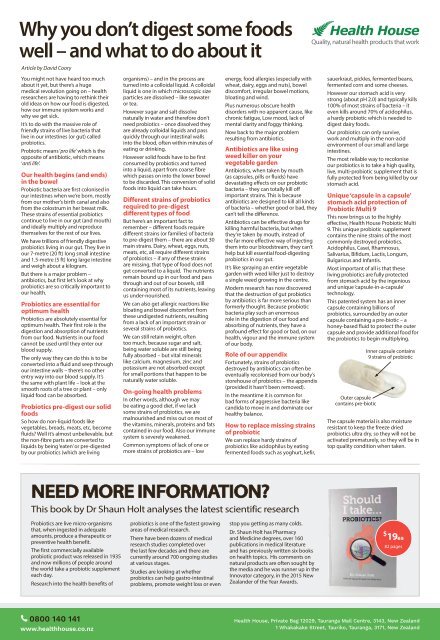Grey Power June 2016
The Grey Power Magazine is a prime national news source for its readers – New Zealand men and women over 50. Circulated quarterly to more than 68,000 members, Grey Power Magazine reports on the policies of the Grey Power Federation, and the concerns of the elderly, backgrounding and interpreting official decisions which affect their lives.
The Grey Power Magazine is a prime national news source for its readers – New Zealand men and women over 50. Circulated quarterly to more than 68,000 members, Grey Power Magazine reports on the policies of the Grey Power Federation, and the concerns of the elderly, backgrounding and interpreting official decisions which affect their lives.
You also want an ePaper? Increase the reach of your titles
YUMPU automatically turns print PDFs into web optimized ePapers that Google loves.
Why<br />
16 national<br />
you<br />
<strong>Grey</strong>power<br />
don’t<br />
mAGAZINE<br />
digest<br />
» june <strong>2016</strong><br />
some foods<br />
well – and what to do about it<br />
Article by David Coory<br />
You might not have heard too much<br />
about it yet, but there’s a huge<br />
medical revolution going on – health<br />
researchers are having to rethink their<br />
old ideas on how our food is digested,<br />
how our immune system works and<br />
why we get sick.<br />
It’s to do with the massive role of<br />
friendly strains of live bacteria that<br />
live in our intestines (or gut) called<br />
probiotics.<br />
Probiotic means ‘pro life’ which is the<br />
opposite of antibiotic, which means<br />
‘anti life’.<br />
Our health begins (and ends)<br />
in the bowel<br />
Probiotic bacteria are first colonised in<br />
our intestines when we’re born, mostly<br />
from our mother’s birth canal and also<br />
from the colostrum in her breast milk.<br />
These strains of essential probiotics<br />
continue to live in our gut (and mouth)<br />
and ideally multiply and reproduce<br />
themselves for the rest of our lives.<br />
We have trillions of friendly digestive<br />
probiotics living in our gut. They live in<br />
our 7-metre (20 ft) long small intestine<br />
and 1.5-metre (5 ft) long large intestine<br />
and weigh about a kilogram.<br />
But there is a major problem –<br />
antibiotics, but first let’s look at why<br />
probiotics are so critically important to<br />
our health.<br />
Probiotics are essential for<br />
optimum health<br />
Probiotics are absolutely essential for<br />
optimum health. Their first role is the<br />
digestion and absorption of nutrients<br />
from our food. Nutrients in our food<br />
cannot be used until they enter our<br />
blood supply.<br />
The only way they can do this is to be<br />
converted into a fluid and seep through<br />
our intestine walls – there’s no other<br />
entry way into our blood supply. It’s<br />
the same with plant life – look at the<br />
smooth roots of a tree or plant – only<br />
liquid food can be absorbed.<br />
Probiotics pre-digest our solid<br />
foods<br />
So how do non-liquid foods like<br />
vegetables, breads, meats, etc, become<br />
fluids? Well it’s almost unbelievable, but<br />
the non-fibre parts are converted to<br />
liquids by being ‘eaten’ or pre-digested<br />
by our probiotics (which are living<br />
organisms) – and in the process are<br />
turned into a colloidal liquid. A colloidal<br />
liquid is one in which microscopic size<br />
particles are dissolved – like seawater<br />
or tea.<br />
However sugar and salt dissolve<br />
naturally in water and therefore don’t<br />
need probiotics – once dissolved they<br />
are already colloidal liquids and pass<br />
quickly through our intestinal walls<br />
into the blood, often within minutes of<br />
eating or drinking.<br />
However solid foods have to be first<br />
consumed by probiotics and turned<br />
into a liquid, apart from coarse fibre<br />
which passes on into the lower bowel<br />
to be discarded. This conversion of solid<br />
foods into liquid can take hours.<br />
Different strains of probiotics<br />
required to pre-digest<br />
different types of food<br />
But here’s an important fact to<br />
remember – different foods require<br />
different strains (or families) of bacteria<br />
to pre-digest them – there are about 30<br />
main strains. Dairy, wheat, eggs, nuts,<br />
meats, etc, all require different strains<br />
of probiotics – if any of these strains<br />
are missing, that type of food does not<br />
get converted to a liquid. The nutrients<br />
remain bound up in our food and pass<br />
through and out of our bowels, still<br />
containing most of its nutrients, leaving<br />
us under-nourished.<br />
We can also get allergic reactions like<br />
bloating and bowel discomfort from<br />
these undigested nutrients, resulting<br />
from a lack of an important strain or<br />
several strains of probiotics.<br />
We can still retain weight, often<br />
too much, because sugar and salt,<br />
being water soluble are still being<br />
fully absorbed – but vital minerals<br />
like calcium, magnesium, zinc and<br />
potassium are not absorbed except<br />
for small portions that happen to be<br />
naturally water soluble.<br />
On-going health problems<br />
In other words, although we may<br />
be eating a good diet, if we lack<br />
some strains of probiotics, we are<br />
malnourished and miss out on most of<br />
the vitamins, minerals, proteins and fats<br />
contained in our food. Also our immune<br />
system is severely weakened.<br />
Common symptoms of lack of one or<br />
more strains of probiotics are – low<br />
energy, food allergies (especially with<br />
wheat, dairy, eggs and nuts), bowel<br />
discomfort, irregular bowel motions,<br />
bloating and wind.<br />
Plus numerous obscure health<br />
disorders with no apparent cause, like<br />
chronic fatigue, Low mood, lack of<br />
mental clarity and foggy thinking.<br />
Now back to the major problem<br />
resulting from antibiotics.<br />
Antibiotics are like using<br />
weed killer on your<br />
vegetable garden<br />
Antibiotics, when taken by mouth<br />
(as capsules, pills or fluids) have<br />
devastating effects on our probiotic<br />
bacteria – they can totally kill off<br />
important strains. This is because<br />
antibiotics are designed to kill all kinds<br />
of bacteria – whether good or bad, they<br />
can’t tell the difference.<br />
Antibiotics can be effective drugs for<br />
killing harmful bacteria, but when<br />
they’re taken by mouth, instead of<br />
the far more effective way of injecting<br />
them into our bloodstream, they can’t<br />
help but kill essential food-digesting<br />
probiotics in our gut.<br />
It’s like spraying an entire vegetable<br />
garden with weed killer just to destroy<br />
a single weed growing in the centre.<br />
Modern research has now discovered<br />
that the destruction of gut probiotics<br />
by antibiotics is far more serious than<br />
formerly thought. Because probiotic<br />
bacteria play such an enormous<br />
role in the digestion of our food and<br />
absorbing of nutrients, they have a<br />
profound effect for good or bad, on our<br />
health, vigour and the immune system<br />
of our body.<br />
Role of our appendix<br />
Fortunately, strains of probiotics<br />
destroyed by antibiotics can often be<br />
eventually recolonised from our body’s<br />
storehouse of probiotics – the appendix<br />
(provided it hasn’t been removed).<br />
In the meantime it is common for<br />
bad forms of aggressive bacteria like<br />
candida to move in and dominate our<br />
healthy balance.<br />
How to replace missing strains<br />
of probiotic<br />
We can replace hardy strains of<br />
probiotics like acidophilus by eating<br />
fermented foods such as yoghurt, kefir,<br />
sauerkraut, pickles, fermented beans,<br />
fermented corn and some cheeses.<br />
However our stomach acid is very<br />
strong (about pH 2.0) and typically kills<br />
100% of most strains of bacteria – it<br />
even kills around 70% of acidophilus,<br />
a hardy probiotic which is needed to<br />
digest dairy foods.<br />
Our probiotics can only survive,<br />
work and multiply in the non-acid<br />
environment of our small and large<br />
intestines.<br />
The most reliable way to recolonise<br />
our probiotics is to take a high quality,<br />
live, multi-probiotic supplement that is<br />
fully protected from being killed by our<br />
stomach acid.<br />
Unique ‘capsule in a capsule’<br />
stomach acid protection of<br />
Probiotic Multi 9<br />
This now brings us to the highly<br />
effective, Health House Probiotic Multi<br />
9. This unique probiotic supplement<br />
contains the nine strains of the most<br />
commonly destroyed probiotics.<br />
Acidophilus, Casei, Rhamnosus,<br />
Salivarius, Bifidum, Lactis, Longum,<br />
Bulgaricus and Infantis.<br />
Most important of all is that these<br />
living probiotics are fully protected<br />
from stomach acid by the ingenious<br />
and unique ‘capsule-in-a-capsule’<br />
technology.<br />
This patented system has an inner<br />
capsule containing billions of<br />
probiotics, surrounded by an outer<br />
capsule containing a pre-biotic – a<br />
honey-based fluid to protect the outer<br />
capsule and provide additional food for<br />
the probiotics to begin multiplying.<br />
Outer capsule<br />
contains pre-biotic<br />
Inner capsule contains<br />
9 strains of probiotic<br />
The capsule material is also moisture<br />
resistant to keep the freeze dried<br />
probiotics ultra dry, so they will not be<br />
activated prematurely, so they will be in<br />
top quality condition when taken.<br />
NEED MORE INFORMATION?<br />
This book by Dr Shaun Holt analyses the latest scientific research<br />
Probiotics are live micro-organisms<br />
that, when ingested in adequate<br />
amounts, produce a therapeutic or<br />
preventive health benefit.<br />
The first commercially available<br />
probiotic product was released in 1935<br />
and now millions of people around<br />
the world take a probiotic supplement<br />
each day.<br />
Research into the health benefits of<br />
probiotics is one of the fastest growing<br />
areas of medical research.<br />
There have been dozens of medical<br />
research studies completed over<br />
the last few decades and there are<br />
currently around 700 ongoing studies<br />
at various stages.<br />
Studies are looking at whether<br />
probiotics can help gastro-intestinal<br />
problems, promote weight loss or even<br />
stop you getting as many colds.<br />
Dr. Shaun Holt has Pharmacy<br />
and Medicine degrees, over 160<br />
publications in medical literature<br />
and has previously written six books<br />
on health topics. His comments on<br />
natural products are often sought by<br />
the media and he was runner up in the<br />
Innovator category, in the 2015 New<br />
Zealander of the Year Awards.<br />
$ 19ea<br />
82 pages<br />
0800 140 141<br />
www.healthhouse.co.nz<br />
Health House, Private Bag 12029, Tauranga Mail Centre, 3143, New Zealand<br />
1 Whakakake Street, Tauriko, Tauranga, 3171, New Zealand


















